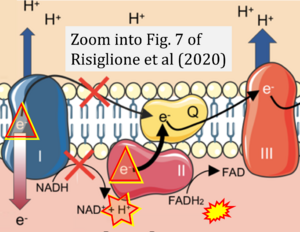Risiglione 2020 Int J Mol Sci
| Risiglione P, Leggio L, Cubisino SAM, Reina S, Paternò G, Marchetti B, Magrì A, Iraci N, Messina A (2020) High-resolution respirometry reveals MPP+ mitochondrial toxicity mechanism in a cellular model of parkinson's disease. Int J Mol Sci 21:E7809. |
Risiglione Pierpaolo, Leggio Loredana, Cubisino Salvatore A M, Reina Simona, Paterno Greta, Marchetti Bianca, Magri Andrea, Iraci Nunzio, Messina Angela (2020) Int J Mol Sci
Abstract: MPP+ is the active metabolite of MPTP, a molecule structurally similar to the herbicide Paraquat, known to injure the dopaminergic neurons of the nigrostriatal system in Parkinson's disease models. Within the cells, MPP+ accumulates in mitochondria where it inhibits complex I of the electron transport chain, resulting in ATP depletion and neuronal impairment/death. So far, MPP+ is recognized as a valuable tool to mimic dopaminergic degeneration in various cell lines. However, despite a large number of studies, a detailed characterization of mitochondrial respiration in neuronal cells upon MPP+ treatment is still missing. By using high-resolution respirometry, we deeply investigated oxygen consumption related to each respiratory state in differentiated neuroblastoma cells exposed to the neurotoxin. Our results indicated the presence of extended mitochondrial damage at the inner membrane level, supported by increased LEAK respiration, and a drastic drop in oxygen flow devoted to ADP phosphorylation in respirometry measurements. Furthermore, prior to complex I inhibition, an enhancement of complex II activity was observed, suggesting the occurrence of some compensatory effect. Overall our findings provide a mechanistic insight on the mitochondrial toxicity mediated by MPP+, relevant for the standardization of studies that employ this neurotoxin as a disease model. • Keywords: MPP+, Parkinson’s disease, SH-SY5Y cells, High-resolution respirometry, Mitochondria • Bioblast editor: Plangger M
Correction: FADH2 and Complex II
- FADH2 is shown as the substrate feeding electrons into Complex II (CII). This is wrong and requires correction - for details see Gnaiger (2024).
- Gnaiger E (2024) Complex II ambiguities ― FADH2 in the electron transfer system. J Biol Chem 300:105470. https://doi.org/10.1016/j.jbc.2023.105470 - »Bioblast link«
On terminology
- For harmonization of terminology on respiratory states and rates, see
- Gnaiger E et al ― MitoEAGLE Task Group (2020) Mitochondrial physiology. Bioenerg Commun 2020.1. https://doi.org/10.26124/bec:2020-0001.v1
- For harmonization of terminology on respiratory states and rates, see
Labels:
MitoEAGLE terminology
Labels: MiParea: Respiration, Pharmacology;toxicology
Organism: Human
Tissue;cell: Neuroblastoma
Preparation: Permeabilized cells, Intact cells
Enzyme: Complex II;succinate dehydrogenase
Coupling state: LEAK, ROUTINE, OXPHOS, ET Pathway: N, S, NS, ROX HRR: Oxygraph-2k
2020-11


